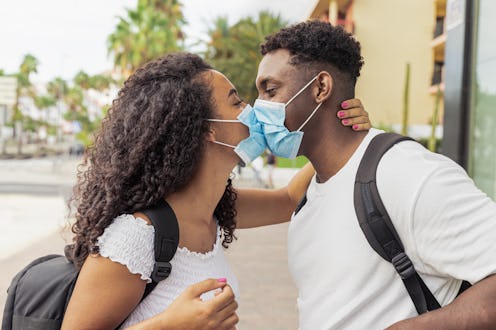Health
A Doctor Explains What Happens If Your Partner’s Vaccinated Before You
Spoiler alert: Not much is going to change.

When Kaycie’s partner of five years got vaccinated through his job at a hospital, she felt relieved. “He sees clients daily through the nature of his job, so it felt good that his risk of contracting a serious form of the virus was reduced,” she tells Bustle. But the 29-year-old Midwesterner isn’t completely able to relax yet. “I understand there’s no perfect way to roll out a vaccine, but I still don’t feel great about it,” she says. “Even though my partner is vaccinated, he can still bring the virus home to me, which is something that worries me.”
Although they’re one step closer to being fully vaccinated as a couple, the cohabitating partners haven’t loosened their COVID-19 protocols — mask wearing, social distancing, not traveling to see their families — just yet. Public health experts say that staying vigilant is the right move — not just until both partners are fully vaccinated, but until over 70-80% of people are, which would keep COVID from spreading in the community.
Though the promise of an effective vaccine is a major gift from science, it can still be confusing on how to proceed if only one partner in a couple is COVID vaccinated, and the other still has to wait to be eligible. Here’s everything you need to know about how to navigate pandemic life after one partner gets vaccinated while the other has to wait.
What If One Partner Gets Vaccinated and You Live Together?
Dr. Sachin Nagrani, MD, medical director of Heal, a healthcare service offering home doctor visits, points out that just because your partner has received an initial dose of the vaccine doesn’t mean they’re in the clear. Even if both of you got the vaccine at the same time, you couldn’t automatically resume “normal life.” Why? “There are two different COVID vaccines made by Pfizer and Moderna. Either type requires two doses with peak immunity achieved two weeks after the second dose. At that point, a vaccinated individual has 95% protection from developing severe illness from COVID-19,” he says. You shouldn't consider yourself fully vaccinated until then.
But main issue in a couple where one person's vaccinated and the other isn't is that the vaccinated partner could still get infected and pass the virus to their partner, even if they didn't get sick. “The vaccine protects against developing severe illness from COVID-19, but its effectiveness at preventing an infection is not yet clear,” says Dr. Nagrani. “The vaccinated partner should continue precautions such as wearing a mask and social distancing in public to protect themselves from an infection that could in theory be transmitted to their loved ones.”
What If You’re In a Long-Distance Relationship, Or Live Apart From One Partner Who’s Vaccinated?
Not much should change, COVID-protocol wise, if only one person in a couple has received the vaccine. “Long distance couples may consider the exposure risk of the vaccinated individual in their daily life and the health risks of the unvaccinated individual. For couples who face higher risk, a quarantine period of 10-14 days before meeting in person is a reasonable precaution,” says Dr. Nagrani.
If you’re not in an LDR, but don’t live together, Dr. Nagrani suggests the same protocols, although you wouldn't have to worry about picking up COVID-19 on an inter-city bus or plane. “Vaccinated individuals should consider these risks and discuss them with their partner,” says Dr. Nagrani. That means you should analyze things like roommates and their professions (if they’re a public-facing essential worker), and individual risk levels before hanging out freely without a mask or quarantine. Basically, the same thing you’ve been doing all pandemic.
Expert:
Dr. Sachin Nagrani, MD
This article was originally published on